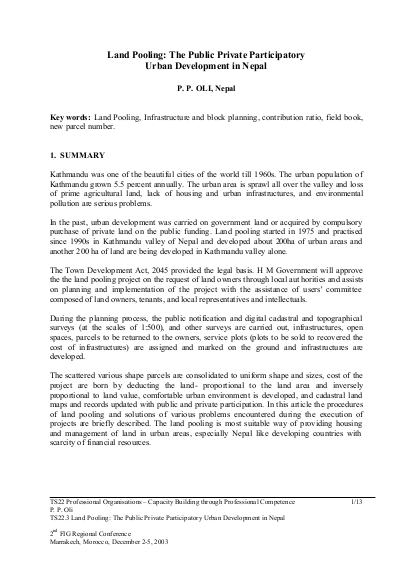
Kathmandu was one of the beautiful cities of the world till 1960s. The urban population of Kathmandu grown 5.5 percent annually. The urban area is sprawl all over the valley and loss of prime agricultural land, lack of housing and urban infrastructures, and environmental pollution are serious problems.
In the past, urban development was carried on government land or acquired by compulsory purchase of private land on the public funding. Land pooling started in 1975 and practised since 1990s in Kathmandu valley of Nepal and developed about 200ha of urban areas and another 200 ha of land are being developed in Kathmandu valley alone. The Town Development Act, 2045 provided the legal basis. H M Government will approve the the land pooling project on the request of land owners through local aut horities and assists on planning and implementation of the project with the assistance of users' committee composed of land owners, tenants, and local representatives and intellectuals. During the planning process, the public notification and digital cadastral and topographical surveys (at the scales of 1:500), and other surveys are carried out, infrastructures, open spaces, parcels to be returned to the owners, service plots (plots to be sold to recovered the cost of infrastructures) are assigned and marked on the ground and infrastructures are developed.
The scattered various shape parcels are consolidated to uniform shape and sizes, cost of the project are born by deducting the land- proportional to the land area and inversely proportional to land value, comfortable urban environment is developed, and cadastral land maps and records updated with public and private participation. In this article the procedures of land pooling and solutions of various problems encountered during the execution of projects are briefly described. The land pooling is most suitable way of providing housing and management of land in urban areas, especially Nepal like developing countries with scarcity of financial resources.
Resource collections
- UN Habitat - Urban Response Collection
- Urban Response - Urban Crisis Preparedness and Risk Reduction
- Urban Response Collection - Community Engagement and Social Cohesion
- Urban Response Collection - Economic Recovery
- Urban Response Collection - Environment and Climate Change
- Urban Response Collection - Housing, Land and Property
- Urban Response Collection - Urban Crisis Response, Recovery and Reconstruction
- Urban Response Collection - Urban Resilience